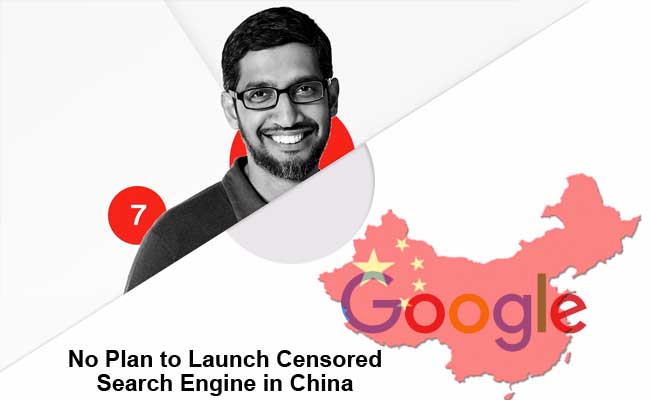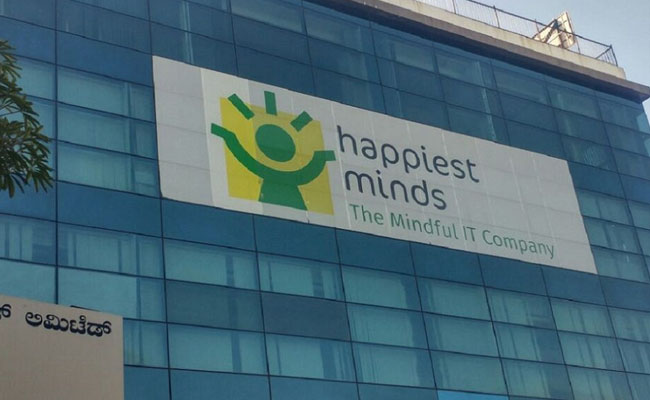Google CEO Sundar Pichai - No Plan to Launch Censored Search Engine in China
By MYBRANDBOOK

Indian-American CEO Sundar Pichai with the House Judiciary Committee told lawmakers Tuesday that, Google currently has no plans to launch a search engine in China. His statement came while testifying before the House Judiciary Committee Hearing on ‘Transparency & Accountability - Examining Google and its Data Collection, Use, and Filtering Practices’. Mr. Pichai as well asserted in front of the House Judiciary Committee on a multitude of different subjects, including perceived political bias in the company’s search results, artificial intelligence, and alleged manipulation of search results.
“We have no plans to launch in China. We don’t have a search product there. Our core mission is to provide users access to information and getting access to information is an important human right,” Sundar Pichai told members of the House Judiciary Committee during a Congressional hearing on Google’s data collection practices.
One hanged-over issue though, which came up a handful of times in the hearing, is DragonFly, Google’s highly controversial search product for the Chinese market. As The Intercept first revealed, DragonFly would censor certain search terms, in particular around human rights. The search platform would also make it easier for Chinese authorities to surveils and track those using the service.
Pressed again by US Representative Tom Marino on DragonFly, Pichai said “Right now there are no plans for us to launch a search product in China.”
“In 2010 Google left the Chinese marketplace due to concerns over hack–hacking attacks, censorship and how the Chinese government was possibly gaining access to data. I’m interested in what has changed since 2010 and how working with the Chinese government to censor research results, a part of Google’s core values,” he said.
“Right now, there are no plans for us to launch a search product in China. We are in general always looking to see how best it’s part of our core mission and our principle is to try hard to provide users with information. We always have evidence based on every country we operate in us reaching out and giving users to more information has a very positive impact and we feel that calling,” Pichai said.
“But right now, there are no plans to launch in China. To the extent that we ever approach a decision like that I will be fully transparent including with policymakers here and engage and consult widely,” he said.
Any time Google looks to operate in a country it would look at what the conditions are to operate.
“There are times in the past we have debated the conditions to operate and we explore a wide range of possibilities. Currently, it is an effort only internally for us. We are not doing this in China. And so you know but I am happy to consult back and be transparent if we plan something there,” he said.
Congressman David Cicilline said the operating environment in China has deteriorated with respect to surveillance censorship and the like since Google first made the decision in 2010 to leave.
In September, he had sent Pichai a letter along with 15 other colleagues raising serious concerns about reports that Google is planning to re-enter the Chinese market with an app-based search engine that would likely have to comply with strict censorship and surveillance requirements imposed by the Chinese government.
“Since then a widespread course of opposition to such a move has emerged including from lawmakers, leading human rights activists and a group of Google’s own employees. The environment has deteriorated,” Cicilline said.
Democrats rejected that claim as "fantasy," and at least one said the search results highlighted more conservative voices.
Pichai said the search engine attempts to help people register to vote or find a polling place, but rejected assertions the company paid for Latino voters' transportation to polls in some states.
"We don't engage in partisan activities," Pichai told the panel.
In a separate letter, Cicilline and 15 other lawmakers and more than 50 human and civil rights organisations opposed the launch of a censored Google search engine for the Chinese market.
The letter alleged that the Chinese government is actively promoting its model of pervasive digital censorship and surveillance around the world.
It’s no secret that Chinese law is particularly strict against technology companies operating in the country, requiring them to hand over data collected on users. Apple outsources its Chinese iCloud services to a local company. An Associated Press investigation recently found that shared data can even include information collected by cars such as Teslas.


Happiest Minds brings in an innovative GenAI chatbot
Happiest Minds Technologies has announced the new GenAI chatbot - ‘hAPPI...

Government mandates encryption for CCTV cameras to ensure netw
In the wake of issuing an internal advisory on securing CCTV cameras at g...

TRAI recommends allowing only Indian entities to participate i
The Telecom Regulatory Authority of India (TRAI) has recommended that onl...

Galaxy AI is available on more devices with Samsung One UI 6.1
Samsung has expanded the range of smartphones to which One UI 6.1 and Gala...


Technology Icons Of India 2023: Gautam Adani
Gautam Adani is the Founder and the Chairman of the Adani Group, an In...

Technology Icons Of India 2023: Josh Foulger
Josh is the Country Head of India and MD of Bharat FIH Ltd (A Foxconn ...

Technology Icons Of India 2023: Rishad Premji
Rishad Premji is the son of the Wipro head Azim Premji and was named a...


NIC bridging the digital divide and supporting government in eGovernance
The National Informatics Centre (NIC) is an Indian government departme...

Aadhaar: Architecting the World's Largest Biometric Identity System
The Unique Identification Authority of India (UIDAI) is a statutory au...

NPCI leading India towards Digital payments
The National Payments Corporation of India (NPCI) is an initiative tak...


SAVEX TECHNOLOGIES PVT. LTD.
Savex Technologies is the 3rd largest Information & Communication Tec...

REDINGTON INDIA LIMITED
Redington (India) Limited operates in the IT product distribution busi...

TECHNOBIND SOLUTIONS PVT. LTD.
TechnoBind’s business model is focused on identifying and partnering...